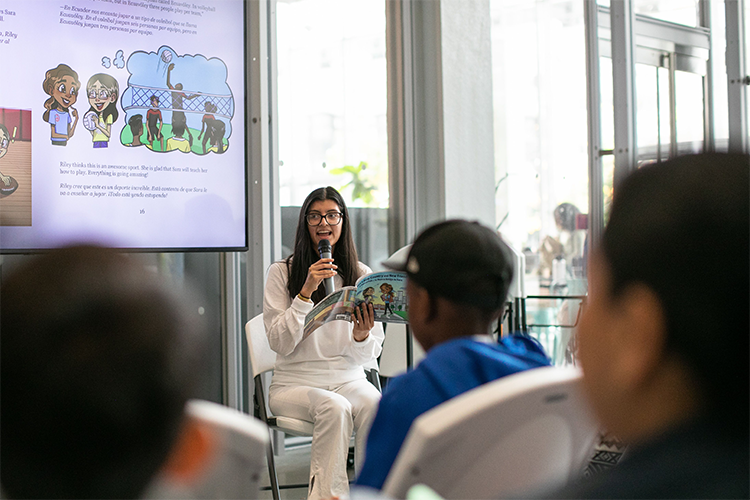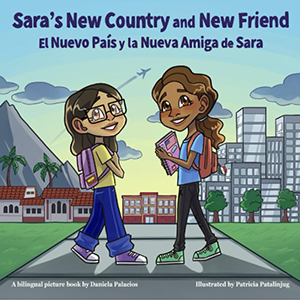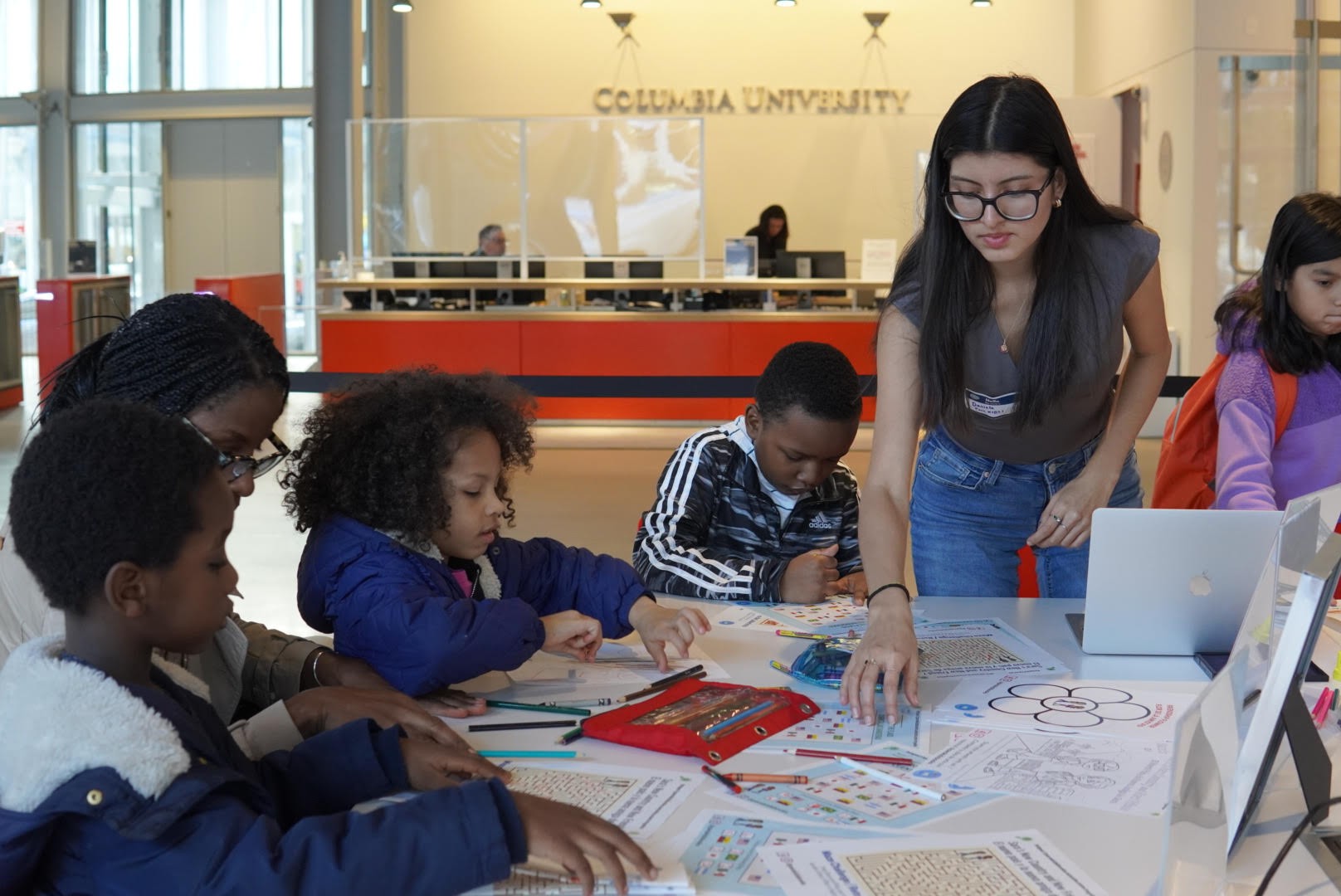Meet a Columbia Student Working at the Intersection of Bilingual Literacy and Community with 'Para KIDS!'
Daniela Palacios offers monthly bilingual readings and activities as part of Saturday Science on Columbia's Manhattanville campus.

When Daniela Palacios (CC’26) was in the third grade in Newark, New Jersey, she distinctly remembers her experience in an English as a Second Language (ESL) classroom.
“Being in that class and having a teacher that understood Spanish and would speak to us in Spanish as well, because we needed reinforcement or clarification, that’s the first time I understood the importance of bilingualism,” Palacios said.
The daughter of Ecuadorian immigrants and a Columbia College sophomore majoring in Political Science, you can find Palacios paying forward the benefits of bilingualism alongside the local community at least once a month with readings and activities at Saturday Science on Columbia’s Manhattanville campus and at the yearly Manhattanville Community Day gatherings.
At age 17 as a junior in high school, Palacios founded Para KIDS! (itself a bilingual name meaning “for kids!”), a media company dedicated to motivating all children to become or remain bilingual. In 2020, during the COVID-19 pandemic, she wrote and published a Spanish and English bilingual children’s book titled “Sara’s New Country and New Friend/El nuevo país y la nueva amiga de Sara."
Palacios was inspired by her younger brother Xavier’s struggles with bilingual communication at home during the pandemic.
Columbia Neighbors sat down with Palacios to learn more about Para KIDS! and the importance of bilingual education.
How did you first come up with the idea of Para KIDS?
I started Para KIDS! a little over two years ago, during COVID, and like any other family we stayed indoors a lot and there was a lot more communication happening. In my bilingual household, we usually feel more comfortable speaking Spanish at home, but my younger brother, whose first language is English, would struggle to understand certain things my parents or I would say to him in Spanish.
I saw how it was impacting him because he would sometimes feel anxious to speak in Spanish, especially with relatives or extended family who only spoke Spanish. As his older sister, it was a heartbreaking moment for me because I’ve always felt being bilingual is my superpower. I wanted my brother to have the same experience, so I started thinking about what I could do to help.

One thing I love to do with my brother is read bedtime stories, so I began to look for bilingual books in English and Spanish, and on all the platforms I searched, the only thing I would come up with were these more advanced books in translation or mainstream hits like “Curious George,” but all in Spanish. There was no dual language, even though they were advertised as "bilingual."
I thought about it and realized that not only can I speak in Spanish, I can write in Spanish. So what if I create a book for my brother, and for others, that would help him and inspire him to keep practicing his English, but also to continue practicing his Spanish so he doesn’t lose it as he grows up? It isn’t just my brother that is going through these issues of language barriers. After talking to other people in my community, whose families had parents or children who did not speak the same language, they also were looking for this sort of resource.
So, I started writing a book.
How did you get the book out into the world?
I was able to find an amazing local illustrator, Patricia Patalinjug, and work with her to create the book. I was also participating in different pitch competitions to promote Para KIDS! and the high stakes of why bilingual education matters. If I placed in those competitions, I used the seed money to pay for illustrations. Those opportunities were super important.
Fast forward, after the illustrations were completed, I was able to self-publish the book through Amazon’s Kindle Direct Publisher. Ever since, I’ve been doing a lot of outreach, going to elementary schools in Newark, visiting public libraries throughout New Jersey, and connecting with family organizations and community centers where I do readings and craft activities. I’m very thankful and want to continue expanding to connect with families and kids in New York City.
What tips and tricks have you picked up along the way for instilling bilingualism in children?
Adding creative elements to a child’s language learning experience is extremely helpful. I began implementing this through my work with Para KIDS! by making activity sheets, things that specifically relate to the book, like the power of friendship. So I made a friendship flower that allows kids to color it in and add the elements of friendship they find important. But even the way I made that worksheet, I was intentional with labeling it in a bilingual way, so kids, when they see it, they can contribute bilingually too. Activities that engage kids to use their different senses, like hearing and touch, can be highly beneficial when learning a new language. For example, bilingual music classes.

What drew you to study at Columbia?
Many things brought me to Columbia, but the biggest thing would be that I immediately felt a sense of community when I visited the campus. You do find people from not just all over the country, but all over the world. And just for me, being so interested in learning more about my own culture and learning more about different people's cultures, that was something that just sounded amazing.
The amount of extracurricular opportunities here also appealed to me. I loved hearing there was an entrepreneurship club on campus because I wanted a place to expand as an entrepreneur. I knew that in trying to balance college and my business, I’d need to have people in my circle who understood and valued what I was doing so I could have that encouragement.
I’m majoring in Political Science because I’m interested in the intersections between education, policy, and business. I mentioned at the beginning of our chat how I really benefited from being in an ESL program, but speaking to friends and family with kids in elementary school now, it sounds like their kids aren’t having that same experience and there is more difficulty teaching ESL. It showed me that there is still a lot of work to be done and I feel like I could make a real impact working on education legislation that would keep programs like ESL going and growing stronger.
What is your favorite word or phrase in English/Spanish that, in translation, brings out a new meaning to you?
It is something that my family, my parents, say a lot. In Spanish it is “La educacion es el pasaporte de tu vida.” In English, it would be “education is the passport to your life.” It resonates with me because the translation doesn’t diminish the value of what both meanings are. They are very similar. However you define education, it is truly the passport to your life. The education that you receive and the knowledge that you gain is something that no circumstance and no person can ever take away from you.
The education that you receive and the knowledge that you gain is something that no circumstance and no person can ever take away from you.
When thinking of bilingualism and language learning, that’s something no one can ever take away from you either. It is a life skill that will serve you forever.
How can children and parents get involved with Para KIDS! going forward?
We’re part of the monthly Neuro Lounge at the Jerome L. Greene Center/Saturday Science. That’s one way for children and families to connect with us. But for more individual connections, I do offer a one-hour bilingual workshop that includes creative craft activities after a bilingual reading. It’s a great way to build community among participants. You can learn more on our website, Instagram, or email [email protected].